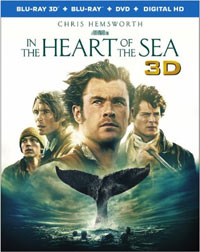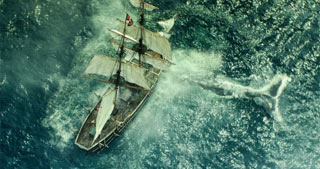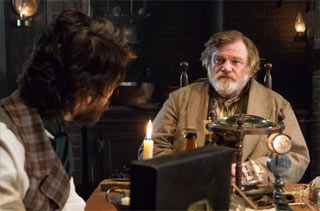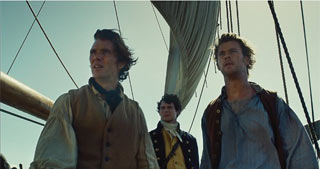
In the Heart of the Sea

 – for intense sequences of action and peril, brief startling violence, and thematic material.
– for intense sequences of action and peril, brief startling violence, and thematic material.
Director: Ron Howard
Starring: Chris Hemsworth, Benjamin Walker, Cillian Murphy, Brendan Gleeson, Ben Whishaw
Running Time: 2 hours, 1 minute
Theatrical Release Date: December 11, 2015
Official Site
Blu-Ray Release Date: March 8, 2016 (Amazon.com)

Plot Summary
In the winter of 1820, the New England whaling ship Essex was assaulted by something no one could believe: a whale of mammoth size and will, and an almost human sense of vengeance. The real-life maritime disaster would inspire Herman Melville’s Moby-Dick. But that told only half the story.
“In the Heart of the Sea” reveals the encounter’s harrowing aftermath, as the ship’s surviving crew is pushed to their limits and forced to do the unthinkable to stay alive. Braving storms, starvation, panic and despair, the men will call into question their deepest beliefs, from the value of their lives to the morality of their trade, as their captain searches for direction on the open sea and his first mate still seeks to bring the great whale down.
(from Warner Bros.)
Film Review
Even if you don’t know all the details of the whale tale Moby Dick, you know the basic story of Captain Ahab’s obsession and the sea faring adventure when a ship’s crew encounter one of the largest creatures in the water. But what few probably realize is that the story was inspired by true events. Director Ron Howard delivers In The Heart of The Sea, telling the harrowing account of the whaling vessel Essex in 1820… when it was attacked by a massive sperm whale.
Howard goes to great lengths to ground the story in reality and historical accuracy, but he also attempts to do so with a modern flair. The two don’t collide as well as intended, however, nearly running the film aground, but the solid performances from the actors and Howard’s veteran filmmaking expertise save In The Heart of The Sea from certain doom. Thor‘s Chris Hemsworth steps in as real-life first mate Owen Chase who braved the sea in search of whale’s oil on the Essex, only to experience some tremendous horrors. Hemsworth is a good actor and he turns in an excellent performance here. The story is hardly for the faint of heart, as the reality of what these men had to endure was truly horrific.

In The Heart of The Sea starts out much like how you’d expect it to. It plays out a bit like Amazing Grace with a dash of Pirates of the Caribbean (minus the lightheartedness and fun), with a great cast leading the way. Howard clearly utilized a lot of green screen and digital effects to recreate the 1800s and the rough seas, and sometimes it’s a bit overbearing and too synthetic. The whales, however, look fantastic and tangible — even in the most gruesome of sequences. And when the crew get inevitably lost at sea, it’s gritty and intense. Howard doesn’t pull his punches too much, but he does know when the audience has seen enough and when to let the narrative take over.
And by that, I’m referring to cannibalism. Some of the crew had to resort to eating those that didn’t make it in order for they themselves to survive. This mere thought is enough to twist the stomach (mine, at least), but these men weren’t ready to die, and it’s what they had to do to press on. Brendan Gleeson plays the war-torn Tom Nickerson, who was just a boy on the Essex in 1820. He relates the story to author Herman Melville many years later–played wonderfully by Ben Whishaw, who is Q in the two most recent Bond films–and powers it with such emotion and conviction. When Howard decides to cut from the visual flashbacks to Gleeson’s telling of the horrors, it’s the perfect way to get the point across without having to show too much. The lost-at-sea scenes, however, reminded me a lot of last year’s Unbroken, but were probably even worse (cannibalism wasn’t a part of that story). Those were some of the more tedious scenes from Unbroken, and while they’re a lot shorter here, they also felt draining to endure. They were also my least favorite aspects of In The Heart of The Sea, and scenes I’d most likely skip over if I see again via at-home viewing.
One other approach Howard took to the direction that I found to be a bizarre choice, was his utilization of very random close-ups during any given scene. He’d zero in on hands doing things or camera angles from the view of a tool or an unusual part of the Essex in what probably would make for a neat, albeit gratuitous, 3D shot, but ultimately they felt completely out of place for this kind of period drama. It also felt much more like something that Guy Ritchie frequently does in his films and less like something I’d expect from Howard. It was odd for Ritchie’s Sherlock Holmes period films, but they also sort of fit the tone of those movies. Here, it just feels wrong, and it frequently lifted me out of the world the film was trying to immerse us in.

The content is pretty rough for a PG-13 movie. At first, you might think it’s rather light, but once they capture their first whale and you see close-ups of flesh and blubber being cut-up, you start to realize the rating is fitting. But once we get the inside view of the hollowed-out whale head in which they then lower young Tom in through a hole cut out… it’s pretty gory. Later, just the mere talk of cannibalism is intense, with other scenes showing a character shooting themselves in the head (but it cuts away from it being graphically shown), and other things like bloody head wounds or bloody spears sticking out of whales and such. The language is mostly the use of “d*mn,” with frequent uses of “g*dd*mn” and a few of “S.O.B.” The theater we were in had some audio problems, so it was tough at times to discern everything said, especially when more than one person was yelling at a time, but there didn’t seem to be any uses of the “S” word or anything stronger.
In the Heart of the Sea has its share of problems, but it doesn’t entirely flounder. A strong cast and solid production values make for a pretty good end result overall, but it’s more than obviously not everyone’s cup of tea. If you’re a fan of the story or anyone in the central cast, I definitely recommend it. But if you’re looking for something a little lighter or perhaps just a little more tightly crafted, you may want to let this one sail on by.
– John DiBiase, (reviewed: 12/12/15)
Blu-Ray Special Features Review
In the Heart of the Sea arrives on Blu-Ray in a DVD/Digital HD combo pack, on DVD, in a 3D/Blu-Ray/DVD combo pack and through the usual digital providers. It’s crisp and clear and looks vibrant in high definition. The special features include the following:
In the Heart of the Sea in 3D – We saw this film in 2D in the theaters and I found Howard’s choice of camera angles odd and sometimes rather distracting. There were a lot of forced perspective angles, with the camera fixed in unusual places – like on an oar while a sailor is rowing or on the side of the ship, etc – but when viewing it in 3D, I can see why Howard decided on those shots (even if I still think they didn’t really fit). This movie was clearly made with 3D in mind, and it’s hard to deny that when watching it in 3D. However, there are still large chunks of the film that seem inappropriate in this format — partially due to the period aspects of the story, and partially because of the dramatic scenes, like when they’re starving to death while lost at sea. Still, if you like 3D movies, this is actually a pretty good one.
Ron Howard: Captain’s Log (15:50) – This featurette is separated by topics but is viewable via a Play All option. Here, Ron goes through his Tweets and photos that he posted to social media during his filmmaking process and the production of the film. It offers some really great behind the scenes photos and video. It covers various key production moments too, including shooting in London at the WB studio, the cast dramatically losing weight, scoring the movie, and water tank filming (1 “b*tching”)
Chase & Pollard: A Man of Means and a Man of Courage (7:28) covers the real life men and the film’s characters — who they were as men and the actors that play them.
The Hard Life of a Whaler (8:44) focuses on whaling life in Nantucket, also covering how the actors had to undergo sailing and whaling camp before filming, so they could capture some authenticity in their roles.
Whale Tales: Melville’s Untold Story (9:13) is about Herman Melville’s writing of the story, Moby Dick, how the Essex’s story inspired the author and how the book was received in its day, as well as how it has endured over time.
Commanding the Heart of the Sea (10:25) is about the special effects created to tell the story. Ron talks about how this was the most difficult movie he has ever made. He also talks about the difficulty of mixing live action filming with the digital world. We’re treated to quite a few special effects passes showing how certain scenes were constructed; they show the original film plate with the effects layered in.
Lightning Strikes Twice: The Real-Life Sequel to Moby Dick (28:59) – This is a documentary about how, in 2008, NOAA discovered a lost Nantucket whaling ship. The documentary reveals, after a lengthy intro, that they believe the ship to be The Two Brothers, another ship Pollard had captained after the Essex… which also ended up getting shipwrecked!
Deleted Scenes (36:02) – There are over 35 minutes of deleted scenes, with 16 segments separated out or available to watch together via “Play All.” They include: An alternate opening sequence showing the one sailor’s encounter with the white whale as it destroys a small ship; Chase leaving his wife to go on the voyage (1 “g*dd*mn,” 1 “d*mn”) with a group gathered for prayer by the dock as they leave; Thomas meeting Chase on the Essex; Pollard addressing the crew before setting sail (2 “g*dd*mn”), and then Chase climbing the mast to cut the sail free. Some of the scenes aren’t totally finished either as we see some of the ship scenes with blue screen behind the actors; Melville and Thomas are shown talking and Melville tells Thomas he believes he’s seen things others haven’t; Pollard telling Chase to “set stunsails.” As another ship called Midas passes them, several of the Essex crew moon them (and we see their bare butts); Thomas telling Melville a story when a fight broke out on the ship (1 “d*mn”); Thomas talking about sailing to the edge of sanity (1 “g*dd*mn”); Some of the crew exhibiting paranoia while trying to sleep at night; Pollard looking shellshocked as the Essex sinks; Chase trapped by a fallen mast as the whale attacks their lifeboats; A brief moment when their ship catches wind in their sails and they find hope again; They find a very gory half-cannibalized body floating in the water, thinking it’s one of their friends who has survived; Pollard going to attack Chase who in turn kicks him into the water. Chase then jumps in to save him (1 “d*mn”); Pollard and Chase talking about what will happen next, after they’ve returned home; Finally, Melville leaves Thomas’s home and there’s a brief montage of him writing the book and later visiting Thomas’s grave, as well as Chase’s (presumably years later).
Extended Scenes (7:11) – There are four extended scenes: Peggy and Chase at home as he packs (1 “d*mn”); Melville and Thomas talking about marriage; A “Mexican standoff” of sorts in the lifeboats. While one of them holds a gun on Chase, he starts singing. The rest soon join in. It then cuts to the “present” as Thomas remembers the song, singing it to himself; Lastly, the men are starving in their boats, almost dead, and Chase mumbles to himself about the importance of whale oil.
Island Montage (3:07) – The scenes of the crew stranded on the island are cut like a trailer, set to dramatic music. It seems rather pointless, to be honest.
For the most part, In the Heart of the Sea is a pretty great value in this combo pack, with lots of extras to keep fans of the film, Moby Dick, and the real life account of the Essex happy and entertained.
– John DiBiase, (reviewed: 3/6/16)
Parental Guide: Content Summary
![]() Sex/Nudity: None, aside from men without their shirts on in several scenes.
Sex/Nudity: None, aside from men without their shirts on in several scenes.
![]() Vulgarity/Language: At least 9 “g*dd*mn,” 1 “*ssh*le,” 5 “d*mn,” 1 “h*ll,” 3 “S.O.B,” 2 “Oh my G-d,” 4 “Oh G-d”
Vulgarity/Language: At least 9 “g*dd*mn,” 1 “*ssh*le,” 5 “d*mn,” 1 “h*ll,” 3 “S.O.B,” 2 “Oh my G-d,” 4 “Oh G-d”
![]() Alcohol/Drugs: Tom drinks a lot while telling the story to Herman; The men drink often on the ship; Matthew Joy refuses to drink at the dinner table, but never says why. Later, we see him grab a bottle when the ship is sinking. In a later scene, he’s seen keeping it close to use if he doesn’t survive (but we never see him drink it).
Alcohol/Drugs: Tom drinks a lot while telling the story to Herman; The men drink often on the ship; Matthew Joy refuses to drink at the dinner table, but never says why. Later, we see him grab a bottle when the ship is sinking. In a later scene, he’s seen keeping it close to use if he doesn’t survive (but we never see him drink it).
![]() Blood/Gore: Young Tom has blood on his hands after a rope scrapes them; Tom throws up on Chase’s shoes; After they spear a whale (which we see the bloody wound of from a distance), we see their faces getting sprayed with the whale’s blood; We see close-ups of the sailors cutting up whale blubber and other whale parts. We then see them hauling buckets of oil out of a hole in the whale’s head. They then force young Tom to go down into the whale’s head cavity and we see the gory inside as he slides into it. He gags several times; We see a man with blood across his face; The survivors of the wreck have many dried scabs on their faces and body; A man has a bloody wound on his head; We see blood in the water when the sailors stab the whales with harpoons, and we see some blood coming from those wounds; We see some human bones in the lifeboats.
Blood/Gore: Young Tom has blood on his hands after a rope scrapes them; Tom throws up on Chase’s shoes; After they spear a whale (which we see the bloody wound of from a distance), we see their faces getting sprayed with the whale’s blood; We see close-ups of the sailors cutting up whale blubber and other whale parts. We then see them hauling buckets of oil out of a hole in the whale’s head. They then force young Tom to go down into the whale’s head cavity and we see the gory inside as he slides into it. He gags several times; We see a man with blood across his face; The survivors of the wreck have many dried scabs on their faces and body; A man has a bloody wound on his head; We see blood in the water when the sailors stab the whales with harpoons, and we see some blood coming from those wounds; We see some human bones in the lifeboats.
![]() Violence: Chase hangs young Tom upside down off the side of the ship in order to cure his seasickness. When he pulls him back on board, Tom throws up on Chase’s shoes; The sailors attack the whales with harpoons and we see them sticking out of the whale; The sailors cut up the whale they capture harvest its body for oil; A large whale crashes through the Essex, sinking it. The survivors get lost at sea for a couple months and are forced to eat the dead; A man shoots himself in the head after the crew draw straws as to who was going to kill themselves to be eaten; A young man threatens to shoot another man, blaming him for their situation; And other action violence involving the sailors at sea and the whales.
Violence: Chase hangs young Tom upside down off the side of the ship in order to cure his seasickness. When he pulls him back on board, Tom throws up on Chase’s shoes; The sailors attack the whales with harpoons and we see them sticking out of the whale; The sailors cut up the whale they capture harvest its body for oil; A large whale crashes through the Essex, sinking it. The survivors get lost at sea for a couple months and are forced to eat the dead; A man shoots himself in the head after the crew draw straws as to who was going to kill themselves to be eaten; A young man threatens to shoot another man, blaming him for their situation; And other action violence involving the sailors at sea and the whales.
